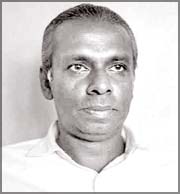Buddhist political philosophy
H.S.S. Nissanka
In 1967, at the Hague Academy of International
Law, late Prof. K. N. Jayatilleke delivered five lectures entitled ‘The
Principles of International Law in Buddhist Doctrine’. The article
explores what Prof. Jayatilleke precisely meant by International Law and
Buddhist Doctrine. Second part was published yesterday.
|

Prof. K. N. Jayatilleke |
Prof. Jayathilleke, in his treatise has referred to the principles of
justice, equity, human rights and equality as accepted by the Buddhist
political philosophy. This writer thinks that the principle of common
good (Bahujana Sukhaya) too should have been included as a principle of
law. The idea of the common good of the mankind has been included as a
principle of law. The idea of the common good of the mankind has been
touched upon by Professor Jaythilleke several times in his treatise.
Acceptance of this Buddhist principle as a principle of international
law may lead to a change in the narrow selfish outlook of modern
international law.
This writer feels that Prof. Jayathilleke has been able to put before
the international jurists at the Hague a case for the Buddhist theory of
international politics. He was able to show that the principles of
international law are not something new to Buddhist political
philosophy.
At this point the writer wishes to remark that the origins of
democracy and International Law are traceable, not to the West but nor
the East (Asia) where Buddhism has had a great impact. Prof.
Jayathilleke summed up his treatise thus: According to the Buddhist
theory of the States, sovereignty is subject to the Dhamma, which in the
Buddhist sense meant the obligation to promote the material and
spiritual welfare of the subjects by means of a home policy. Therefore,
it follows that the State has to guarantee human rights extending
security for birds and beasts as well.
In foreign policy the State has an obligation not to commit
aggression and to co-operate with other States for the common good of
mankind.
The policy of maximizing material and spiritual welfare and acting in
a spirit of friendly co-operation with other nations is held up not as a
Utopian ideal but as one that is expedient and fruitful of beneficial
results. By it one strengthens the power of one’s State and the bonds of
humanity.
The above mentioned ideas presented by Prof. Jayathilleke on a
scholarly basis is only an attempt at opening a new field of study.
As is argued in his treatise, for the management of international
affairs geared to the common good of mankind, the need for a sound
theory of international politics and a commonly accepted and codified
international law which had been outlined by this brilliant scholar,
who, had he lived, would surely have risen to greater and even greater
eminence in his chosen field.
This is time for us to convince President Mahinda Rajapaksa that he
has to play an international role in rekindling the ideals of emperor
Dharmasoka of Maha Bharata.
-Concluded |



